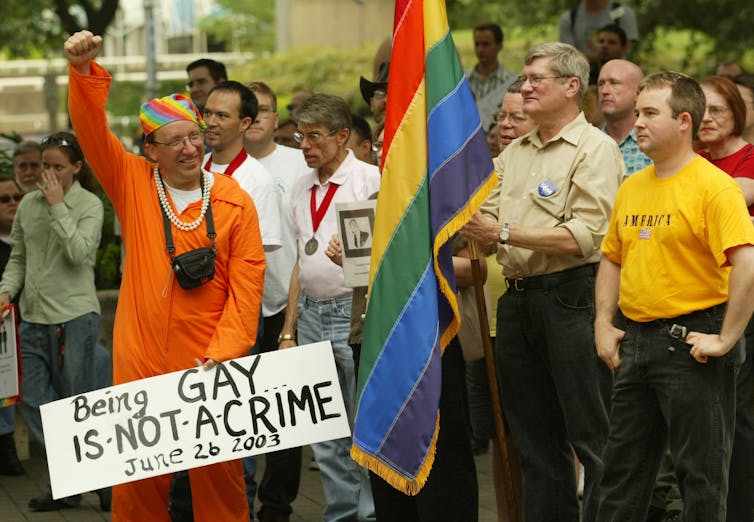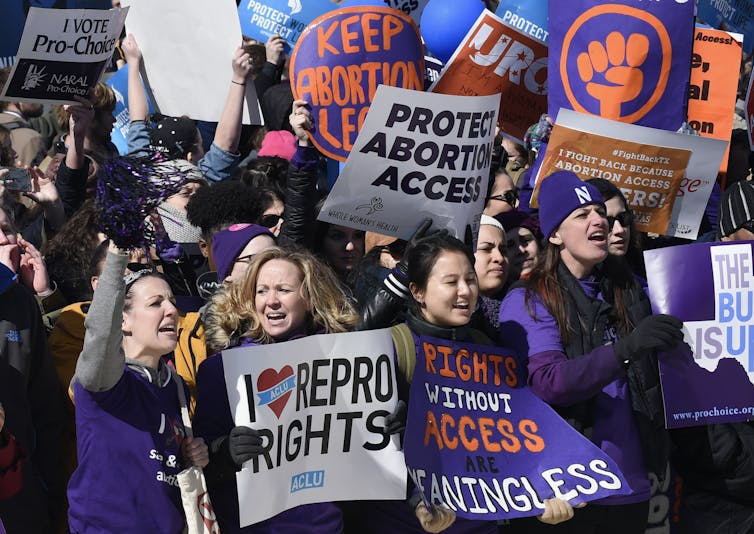Kavanaugh's impact on the Supreme Court and the country may not be as profound as predicted
- Written by Ofer Raban, Professor of Constitutional Law, University of Oregon
Brett Kavanaugh’s appointment to the Supreme Court has been widely predicted to plunge the court[1] – and American law with it – into a new conservative era.
The main areas of concern include[2] reproductive rights, LGBT rights, affirmative action, environmental regulations, criminal punishments, gun rights and voting rights.
But these prognoses fail to heed some fundamental distinctions among the decisions of the Supreme Court, and may create a mistaken impression of the court’s power and the inevitable trajectory of American law.
Simply put, Supreme Court rulings are often not the last word on a matter.
What the court does
The U.S. Supreme Court performs two primary tasks: interpretation of federal laws and interpretation of the federal Constitution[3].
The Supreme Court has the final authority to determine what laws enacted by Congress require. But its determinations can always be reversed by Congress, which has the power to amend or repeal the laws it has passed.
 President Barack Obama hands Lilly Ledbetter the pen he used after signing the Lilly Ledbetter Fair Pay Act, which was passed to undo a Supreme Court ruling.
REUTERS/Jim Bourg[4]
President Barack Obama hands Lilly Ledbetter the pen he used after signing the Lilly Ledbetter Fair Pay Act, which was passed to undo a Supreme Court ruling.
REUTERS/Jim Bourg[4]
For example: In 1964 Congress gave employees the right to sue their employers for discrimination based on gender. In 2007, a 5-4 conservative majority read that law in a way that limited the available compensation for women suing for equal pay[5]. Within two years Congress responded by increasing the available compensation[6].
The Supreme Court also has final authority to determine what the U.S. Constitution requires. It does so by deciding cases that challenge the constitutionality of federal and state laws. Generally speaking, the court either declares the law in question to be constitutional or unconstitutional.
When the court declares that a law is constitutional, it effectively steps out of the way of decisions made by other branches of government. But those other branches can always change their decisions.
For example, in 1990 the court ruled that Oregon’s prohibition of the use of a hallucinogenic in religious Native American ceremonies was constitutional. The ruling allowed the Oregon legislature to criminalize such use[7].
But the Oregon legislature remained free to amend or repeal the law – which it promptly did. Within a year of the Supreme Court decision, the Oregon legislature amended its law to allow the consumption of peyote in religious ceremonies[8].
Moreover, when the Supreme Court declares that a state law is constitutional under the U.S. Constitution, state courts are free to decide that the law is unconstitutional under their own constitutions.
For example: After the Supreme Court decided that a Georgia law criminalizing sodomy was constitutional[9], the Georgia courts declared the law unconstitutional under the Georgia Constitution[10].
State constitutions can provide more rights and liberties than those protected by the federal Constitution. All 50 states have their own constitutions[11] which are often easy to amend. And most state judges – who have the final authority over state constitutions – are elected for office[12], making them responsive to public opinion.
Decisions that cannot be undone
Things are different when the Supreme Court declares that a law violates the U.S. Constitution.
When the Supreme Court declares a law unconstitutional, its ruling is the final word. Congress, state legislatures or state courts cannot make such Supreme Court decisions go away. These decisions can be overridden only by a constitutional amendment[13] – which, at the federal level, is almost impossible to attain. There have been only 17 amendments in the past 223[14] years.
For example, when the court declared in 2003 that a Texas statute making sodomy a crime was unconstitutional[15], neither the Texas legislature, nor the Texas courts, nor Congress could change or repeal that decision.
 When the Supreme Court ruled in 2003 that a Texas law criminalizing sodomy was unconstitutional, the decision was irreversible.
Reuters/Richard Carson[16]
When the Supreme Court ruled in 2003 that a Texas law criminalizing sodomy was unconstitutional, the decision was irreversible.
Reuters/Richard Carson[16]
Heeding this distinction – between Supreme Court decisions that are the final word on an issue and those that can be undone – is important for a fuller appraisal of Kavanaugh’s expected impact.
Recourse in some decisions
Many of the concerns over Kavanaugh’s appointment are about potential decisions that can be reversed by the democratic process.
Take environmental regulations.
Worries about an anti-environmentalist Supreme Court are largely concerns about the court’s statutory interpretation. That means that decisions in this area can mostly be amended or overruled through the legislative process.
For instance, one central environmentalist concern with Kavanaugh is that the court will cease to defer to the decisions of the Environmental Protection Agency. But such rulings, if they occur, would be based on the court’s interpretation of federal laws[17]. And these laws could always be amended by Congress.
Or take abortion: Those who fear Kavanaugh’s impact on abortion rights[18] are almost exclusively worried that the court would uphold state laws that restrict access to abortions – like the 2013 Texas law that caused the closure of several abortion clinics in that state[19].
But such Supreme Court rulings can be countered at the ballot box, where voters could install state lawmakers or judges who would expand abortion rights[20].
There is an important qualification to this general rule. While Supreme Court decisions that declare laws to be constitutional can be made irrelevant by legislatures or by state courts, things are trickier when it comes to laws that distort our democracy - like onerous voter ID requirements or gerrymandered voting districts.
After all, such decisions impact the composition of the very institutions that could remedy the issue. Officials elected thanks to voter suppression or political gerrymandering are not likely to repeal such measures. Thus, Supreme Court decisions that uphold antidemocratic measures should also count as potentially irremediable.
 If the court limits abortion rights, the democratic process can restore them.
Reuters/Richard Carson[21]
If the court limits abortion rights, the democratic process can restore them.
Reuters/Richard Carson[21]
No significant difference
The Supreme Court wields its most significant and enduring power when it makes decisions that cannot be remedied by the democratic process. So it makes sense to pay particular attention to those kinds of decisions when examining the significance of Kavanaugh’s appointment.
Liberals’ concerns over the court’s irremediable decisions[22] are primarily about gun control, affirmative action, religious exemptions for LGBTQ anti-discrimination requirements, campaign finance regulations, and upholding laws that distort our democracy.
But when it comes to these areas, it is hard to see how Kavanaugh could make a significant difference. The major turns to the right have already occurred.
Since John Roberts became chief justice, the Supreme Court had already invalidated gun controls by revolutionizing Second Amendment doctrine[23]. It had already invalidated numerous campaign finance regulations[24] and extended constitutional protections to what many regard as political corruption[25]; it had already invalidated the enforcement of an LGBT anti-discrimination measure[26] on grounds of religious freedom; and it already invalidated affirmative action admission programs at K-12 schools[27].
As for laws that distort our democracy: The Roberts Court had already upheld a voter ID law described as voter suppression[28]; upheld Ohio’s aggressive purges of its voter rolls[29]; and had never met a case of political gerrymandering – which effectively imposes a minority rule – that it did not find constitutional.
The Roberts Court was already the most conservative Supreme Court in many decades[30] – even before Kavanaugh’s appointment, and also before Neil Gorsuch’s. It is worth remembering, though, that the American public is not without recourse. Many of the court’s past and future decisions can be undone at the ballot box.
References
- ^ has been widely predicted to plunge the court (www.nytimes.com)
- ^ The main areas of concern include (www.wcjb.com)
- ^ interpretation of federal laws and interpretation of the federal Constitution (www.supremecourt.gov)
- ^ REUTERS/Jim Bourg (pictures.reuters.com)
- ^ limited the available compensation for women suing for equal pay (www.oyez.org)
- ^ increasing the available compensation (www.congress.gov)
- ^ criminalize such use (www.law.cornell.edu)
- ^ allow the consumption of peyote in religious ceremonies (www.oregonlaws.org)
- ^ Georgia law criminalizing sodomy was constitutional (www.law.cornell.edu)
- ^ unconstitutional under the Georgia Constitution (www.courtlistener.com)
- ^ All 50 states have their own constitutions (ballotpedia.org)
- ^ are elected for office (www.brennancenter.org)
- ^ overridden only by a constitutional amendment (www.supremecourt.gov)
- ^ 17 amendments in the past 223 (www.usconstitution.net)
- ^ Texas statute making sodomy a crime was unconstitutional (www.law.cornell.edu)
- ^ Reuters/Richard Carson (pictures.reuters.com)
- ^ the court’s interpretation of federal laws (www.scotusblog.com)
- ^ fear Kavanaugh’s impact on abortion rights (www.vox.com)
- ^ closure of several abortion clinics in that state (www.oyez.org)
- ^ lawmakers or judges who would expand abortion rights (www.reproductiverights.org)
- ^ Reuters/Richard Carson (pictures.reuters.com)
- ^ Liberals’ concerns over the court’s irremediable decisions (www.nytimes.com)
- ^ revolutionizing Second Amendment doctrine (www.oyez.org)
- ^ invalidated numerous campaign finance regulations (www.oyez.org)
- ^ many regard as political corruption (www.oyez.org)
- ^ LGBT anti-discrimination measure (www.oyez.org)
- ^ affirmative action admission programs at K-12 schools (www.oyez.org)
- ^ voter suppression (www.oyez.org)
- ^ purges of its voter rolls (www.oyez.org)
- ^ most conservative Supreme Court in many decades (www.nytimes.com)
Authors: Ofer Raban, Professor of Constitutional Law, University of Oregon

